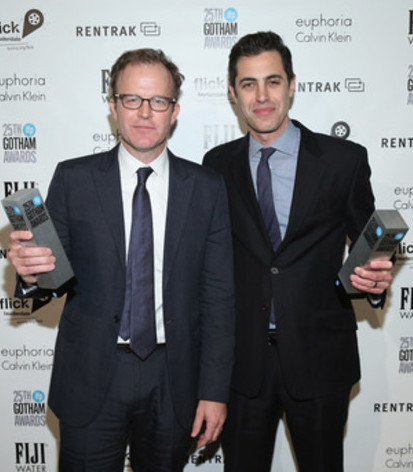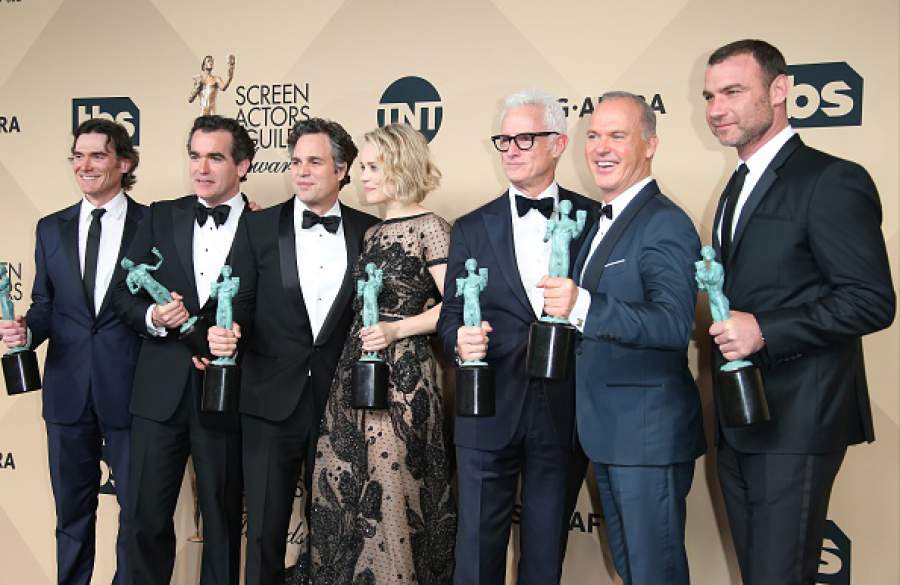 Tom McCarthy and Josh Singer at the Gothams. It would not be the last award for their SPOTLIGHT screenplayAs we head toward Oscar night in an unusually complicated Oscar race, Spotlight is one of the films that's still in the thick of it. And with good reason. This finely tuned gripping account of the Boston Globe's long investigation into sex-abuse coverups was, by any measure, one of the most acclaimed films of the year.
Tom McCarthy and Josh Singer at the Gothams. It would not be the last award for their SPOTLIGHT screenplayAs we head toward Oscar night in an unusually complicated Oscar race, Spotlight is one of the films that's still in the thick of it. And with good reason. This finely tuned gripping account of the Boston Globe's long investigation into sex-abuse coverups was, by any measure, one of the most acclaimed films of the year.
The director Tom McCarthy is a flexible talent -- he acts, writes, and directs -- so it was something of a surprise that he shared writing duties on Spotlight with Josh Singer (The West Wing, The Fifth Estate). But that's somehow perfect since the film places such beautiful emphasis on community and teamwork. And when I began to speak with Singer about his involvement this communal spirit was also obvious. He immediately began deferring praise to the actors, and Tom's gift with them, and was so pleased that they'd been honored already this awards season.
Here's our interview, edited for length and clarity...
NATHANIEL R: Spotlight is unusual in that the lead character is really the investigation itself
JOSH SINGER: It’s really an ensemble piece. Tom wanted this to be about the Spotlight team. It made me nervous early on, not having one or two protagonists. We have six!
NATHANIEL: Tom McCarthy doesn’t usually collaborate on his screenplays. So tell me what happened there.
 SPOTLIGHT winning a very deserved "ensemble" prize last month at SAG
SPOTLIGHT winning a very deserved "ensemble" prize last month at SAG
JOSH SINGER: Tom came on as director at first. It started with him just hiring me to write this thing back in August 2012. I spent about a week with Michael Rezendes (Played by Mark Ruffalo in the movie), who happened to be in LA. I took him out to lunch every day that week. At the end of the week I sat down with Richard Sipe, who’s the voice on the box played by Richard Jenkins in the film, and an expert in clergy sex abuse. Awesome sit downs. At the end of that first week I had 54 pages of notes. Mike gave me the 'this is how it happened' and Sipes the history and theory, which is right on the money, that this is a systemic problem; it's not a few bad apples and it really cuts to the core of how the church’s secrecy is a requirement.
When did Tom jump in?
I came East to talk to all the rest of the reporters in Boston. So I said, Tom, 'do you want to come up?' So we sat with most of the primary reporters in the film. Not only was he intrigued, we had a good time just hanging out and doing these interviews. Because of Tom's emphasis on authenticity and vision for the film, he pushed us to go back and back and back more than I necessarily would have gone on my own. I started writing an outline, and I showed him early on, to a point where we were breaking the story together. At some point he said 'This would probably go quicker if we just write it together.'
I was thrilled. I had gotten to know Tom and like him very much as a human, I already was a huge fan of his films. It felt very natural, and it also felt like, this is the best move to getting this film made. Because we collaborated so intimately from the beginning, I wound up staying around during prep and production. Because I knew the details so well, I was able to help out a lot on the set.

In many ways Spotlight is a procedural. Sometimes that genre, from my perspective, doesn't leave much room for the actors because it's so much exposition. Was that a tricky balancing act in the writing? Take Michael Keaton. You could write a lot of dialogue of Robby coming into self-awareness and realizing their complicity in not acting sooner. But he’s such a strong actor that he can convey that in just a look.
There's a luxury you have in writing movies, especially when you’re writing with a director who’s so good with actors. You know the small moments you’re gonna get to convey those things so you can write with that in mind. Whereas in television, there’s much more of an obligation to the audience, especially on network television, to be very very clear. Also in television, you’re working with good directors, but they change. And you just don’t have the time. You’re shooting eight page days. In features, you’re shooting two to four page days.
And again, I was writing with a director who’s fantastic at casting, who’s fantastic at getting great performances. So there’s a luxury in that as a writer. You’re allowed to be more subtle.
The movie flows very well and it's very engaging, but it seems that, by necessity, you would have had to leave tons of stuff out. Was that very hard? The team keeps discovering more as they go and I'm sure you did, too.
Yes. But because we decided to play this as the investigation only up to the two big stories that broke in January of 2002, and that helped us as to what to leave out. As it says at the end of the film, they wrote 600 articles. They wrote for another year and a half after our film ends! Moreover because Sept 11 took up five to six weeks of reporters’ time, we’re only taking, you know, five months minus six weeks. Some fact based dramas are trying to condense years, which is much more challenging. There was obviously a ton of investigation, but a lot of it really went on after.
And outside of Boston too.
We don’t get into all the other cities and around the world. So in that way, we’re culling.
So much to grapple with and then writing as a team.
It’s a little bit of wrestling, Keep up!
You worked on The West Wing, and another Oscar contender this year is Steve Jobs written by Aaron Sorkin. Did you work much with him?
I unfortunately never had the pleasure. I worked on the last three years of The West Wing, when Aaron left the show and John Wells took over. John was a fantastic boss. That was my first job out of grad school, and coming out of law school, I didn’t know anything about writing! But getting to work with very famous writers -- the staff was ridiculous -- I got to learn from all of them.
 The West Wing
The West Wing
NATHANIEL: But how would you go from knowing nothing about writing to getting that job?
JOSH SINGER: I was literally in law school, trying to figure out what to do, and was very depressed by Gore v Bush. I knew a little bit about children’s media, because I had worked with Children’s Television Workshop and had done an internship with Disney Channel, so I was thinking about writing for children's television. And then I started watching The West Wing.
I can imagine how that would be inspiring. A rough time for many of us.
I said, 'Well maybe I do want to be involved in adult film and television and try to have conversations about issues in this really interesting way, a dialogue with millions of people on a weekly basis!' I wrote a spec for The West Wing and that’s what got me the job. When I was at Telluride, Spotlight and Steve Jobs were making some noise, and I thought to myself "Well, Aaron sort of has two films here." [Laughs] Because if it were not for Aaron, I wouldn’t be in the business!
Maybe Tom makes Spotlight anyway, but, you know, it’s probably a slightly different film. I really owe a great deal to the people from The West Wing.
Since you were there throughout the production of Spotlight was there anything that was a revelation for you about watching actors film your words?
I think the biggest thing I learned on Spotlight -- I had heard a lot about rewriting onset of a movie but I never understood why you would do that. I had written a couple movies. On The Fifth Estate, Bill Condon very much wanted to get that script locked before going to set. I was not on set very much and they didn’t change it a lot. Here, Tom and I changed it a ton. And it was really surprising to me. If you had told me before we started production that you are going to be rewriting almost every scene, almost every day, I would have vomited.
[Laughter]
I would have lost it. 'Well how are we gonna do that? This script is so intricate!' But Tom was always relentless about pushing deeper. I think it’s one of his greatest assets -- pushing and pushing and pushing on scenes to really get to know them. But beyond that, I could see, just like on a television show, you shoot the pilot, and you sort of know what you have but you don’t really know what you have. Over the course of it, the show evolves. You see what your actors are doing and you see what you have, so you start to write differently. Five days into the shoot, you start to see how the actors are working together, how these themes are playing out, and you realize, 'Ohhh!'
That must be exciting to watch and writers don't always get to do that.

JOSH SINGER: It’s a little bit like, you have a coloring book and pages start to get colored in. 'Oh, this is what the book looks like!' And you start to change the black and white outline of the other pages.
There’s the old adage that there are three movies; there’s the movie you write, the movie you shoot, and the movie you cut. And the movie you shoot is different than the movie you write, and when you start to understand what that entity is, you start to wanna write toward that. Almost every scene is not the original we attacked.
NATHANIEL: How did the actors respond to that?
JOSH SINGER: They weren't always so thrilled [Laughs]. I was giving them pages at the last minute. I said at one point to Rachel, 'You don’t give us any incentive not to do the rewriting, because you’re so good turning it around!' I don’t know if she really loved that joke much, but it’s true.

interview index | oscar charts